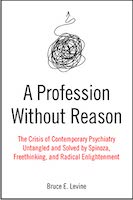Are Antidepressants Faith-Based Treatment?
Bias in drug studies may mask the mind’s role in overcoming depression.
While millions of people swear by Prozac, Zoloft, and other antidepressants, do they work any better than a placebo or no treatment at all?
How Teenage Rebellion Has Become a Mental Illness
Big pharma has some new customers. Not complying with authority is now, in many cases, labeled a disease.
For a generation now, disruptive young Americans who rebel against authority figures have been increasingly diagnosed with mental illnesses and medicated with psychiatric (psychotropic) drugs.
America’s Love-Hate Relationship With Drugs
Many prescription drugs have effects similar to those of illegal drugs. But we still view some users as criminals – the others as patients.
While Americans are inundated with coverage of the Democrats’ quibbling over Barack Obama’s use of marijuana and cocaine as a teenager, a truly important drug story continues to be neglected: The hypocrisy of Big Pharma, psychiatry officialdom, and justice institutions regarding mood-altering (psychotropic) drugs – specifically the denial of the similarity between illegal and psychiatric drugs.
Is Our Worship of Consumerism and Technology Making Us Depressed?
It would be a lot easier to address the increasing rate of depression among Americans if we weren’t so afraid to admit that our consumer society makes us unhappy.
The following is an excerpt from Surviving America’s Depression Epidemic: How to Find Morale, Energy, and Community in a World Gone Crazy (Chelsea Green, 2007) by Bruce E. Levine, and is reprinted here with permission from the publisher. In this book, Levine delves into the roots of depression and links our increasingly consumer-based culture and standard-practice psychiatric treatments to worsening depression, instead of solving it.
As mental illness has become profitable, we are seeing more of it
The U.S. Psycho-Pharmaceutical-Industrial Complex
In Eugene Jarecki’s documentary film Why We Fight, about the U.S. military-industrial complex, U.S. foreign policy critic Chalmers Johnson states: “I guarantee you when war becomes that profitable, you are going to see more of it.” Similarly, as mental illness has become extremely profitable, we are seeing more of it.
Book Reviews: Lincoln’s Melancholy; Against Depression
If we declare depression to be nothing but a disease, as Peter Kramer
demands in Against Depression, then billions of dollars will continue to
pour into biotech research and treatment and we will continue to ignore
the societal and cultural causes of depression. If instead, we see
strengths in those with depressive temperaments, as does Joshua Wolf
Shenk in Lincoln’s Melancholy, then we become uneasy about handing over
our despair to profit-hungry biotech corporations.
STAR*D Wars
The Corruption of the National Institute of Mental Health and the Failure of Antidepressants
On March 23, 2006, STAR*D results were major news, front page in the Washington Post. STAR*D, the official acronym for Sequenced Treatment Alternatives to Relieve Depression, was a two-step antidepressant treatment study funded by the National Institute of Mental Health (NIMH), costing U.S. taxpayers $35 million. The NIMH proclaimed that STAR*D showed that 50 percent of people with depression can get better within the two treatment steps using this approach; and STAR*D researchers declared, A 50 percent remission rate is extraordinarily good, given the nature of these disorders. The Associated Press and much of the media simply echoed the enthusiasm of NIMH and STAR*D researchers.
U.S. Mental Illness Epidemic
By 2003 in the U.S., 1 in 50 had been classified as disabled mentally ill, an increase from the 1987 rate of 1 in 75 (based on Social Security Administration payments for the mentally ill). This was reported in the journal Ethical Human Psychology and Psychiatry in 2005 by science writer Robert Whitaker who also noted that 1 in 300 were considered disabled mentally ill in 1955, an increase from 1 in 500 in 1903 (1955 and 1903 statistics based on U.S. mental illness hospitalizations).
Behind the Paxil Scandals
In June 2004 New York State Attorney General Eliot Spitzer brought suit against Glaxo, alleging that it had engaged in repeated and persistent fraud with respect to Paxil (a $3.1 billion grossing drug in 2003). Spitzer had evidence that the giant pharmaceutical corporation Glaxo had suppressed the results of studies on children and adolescents that showed Paxil to be ineffective and to increase the risk of suicidal thinking and behavior. When he first announced the suit, Spitzer stated, “By concealing critically important scientific studies on Paxil, GlaxoSmithKline impaired doctors’ ability to make the appropriate prescribing decision for their patients and may have jeopardized their health and safety.” Spitzer had an internal Glaxo memo from 1998 stating that the company intended to “manage the dissemination of the data in order to minimize any potential negative commercial impact.”
Indian Problems: Shrinks, Lies, and Justice
There is no doubt that alcohol abuse and other self-destructive behaviors are major problems among modern Indians. Is this a medical issue that will be solved by psychiatrists, psychologists, and social workers? Or is this a political issue that can be solved only by ending the oppression of Indians? There are of course many healthy […]




